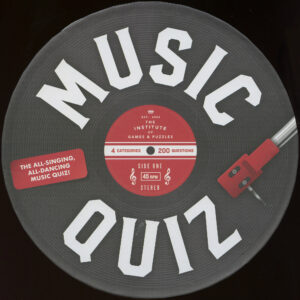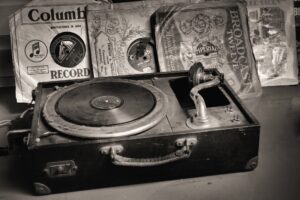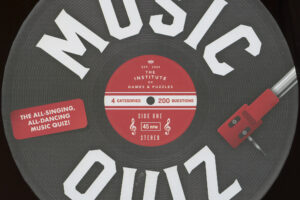 Editor’s Note: About a month ago, TDMB somehow got onto the front page of Reddit. That translated into a tremendous amount of traffic and emails from folks wanting to subscribe to our newsletters. One of those folks was Sean Nelson, who asked the very reasonable question of why we haven’t covered metal.
Editor’s Note: About a month ago, TDMB somehow got onto the front page of Reddit. That translated into a tremendous amount of traffic and emails from folks wanting to subscribe to our newsletters. One of those folks was Sean Nelson, who asked the very reasonable question of why we haven’t covered metal.
I asked Sean to write a piece explaining why he liked the genre, which he did. I then suggested a piece expanding on his thoughts. The idea is that many older people — included those that count themselves as open-minded — have trouble with metal. Here is part one of Sean’s response to my request. I will post the second part next Tuesday.
(Photo: Andrew King)
Sean Nelson
In the summer of 1997 I hear my sister’s bedroom door slam. The scratches of her record player tell me a vinyl is beginning to spin. What happened next was my first experience with heavy metal. To many people the words bring to mind a set of mop-haired, burly men thrashing guitars, screaming profanities and worshiping Satan. For as long as metal music has existed it has been wrought with controversy and ridicule. Parents and church groups were losing sleep at night knowing that children were listening to such ‘vile blasphemy’. They were shocked at this new wave of music that they labeled ‘evil’ and put up an effort to stop it from growing and infecting the minds of youth. One writer wrote that heavy metal is “unsophisticated music for unsophisticated people.” He went as far to say it was: “Sick, repulsive, horrible and dangerous” With all this hate and disgust over metal, it makes sense to look at why it sparks such a negative response from mainstream society by exploring its origins, its themes, and why some people can become so drawn to it.
While heavy metal’s origins trace back to the birthplace of all rock (southern American blues), its true development took place in the 1960s when bands began experimenting with covers of classic blues songs, often by increasing the tempos. Eventually a characterization of loud, distorted guitars was produced. With loud guitars, louder drums, and vocals were all required in creating intense sound, and more dramatic performances. A fusion of blues rock and psychedelic rock became the basis of what was to become heavy metal.
The term heavy metal does not have a clear origin. It was used musically in the lyrics in the 1968 song ‘Born To Be Wild’ by early metal band Steppenwolf. The lyrics: “I like smoke and lightning, heavy metal thunder, racin’ with the wind, and the feelin’ that I’m under” Aclice Cooper, one of the pioneers of metal, stated in an interview that the term heavy metal was first used officially by Rolling Stone magazine when describing his music. Cooper is quoted saying “Actually the first time heavy metal was ever used was used about Alice Cooper in Rolling Stone magazine. They were doing an interview with us… and it said “’Heavy metal’” in quotes”.
The 1980s saw metal reach a huge audience. Its popularity had increased dramatically and in America and elsewhere it developed a strong cult following. It was common to see kids growing their hair, playing air guitar, and brandishing the Devil’s horns. The horn gesture can be traced back to Italy and some Mediterranean cultures. In these places, people use the gesture when confronted with unfortunate events, or simply when these events are mentioned. The sign of the horns may be given to ward off bad luck. It is also used traditionally to counter or ward off the “evil eye” (malocchio).
Metal music constantly pushes at the boundaries of what is considered socially acceptable and by doing so has always attracted an air of negativity. The lyrics used in metal music have a tendency to explore dark themes that people prefer to avoid or pretend don’t exist. Black Sabbath, one of the first metal bands, emerged from the gritty lower class streets of Birmingham in the United Kingdom. Inspired by horror films and taking influences from their bleak hometown set a dark, doomed theme in Black Sabbath’s music. Similar origins are common for metal bands. Musician James Shaffer explained it this way: “Kids are bored, agitated, especially if they have problems at home – parents, drug addiction, alcoholism – it all contributes to the product of a young, angry musician.” Poor, bleak and neglected homes and darkly atmospheric hometowns would have bread bored, angry and aimless teenagers who would eventually use music to express these feelings.
One could argue that metal is born from the suffering of lower class people, the same birth as blues music which all rock is derived from. Metal prides itself on being anti-conventional. It completely rejects popular culture and has formed its own minority group based on different values. The sub-culture can be characterized by a strong dislike and distancing from habitual music, artists that are devoted to their fans, expressions of opposition to authority and expression of ability in society is also considered important. “It’s outsider music and it’s outsider subjects and as a kid I was an outsider and I think that that’s where the work begins,” said metal musician Rob Zombie.
Dir en Grey: “Zan”
Heavy, virtuosic music has always faced controversy. When an artist experiments with new techniques they are almost always met with criticism. Composer Richard Wagner, who actually reshaped the orchestra and experimented frequently with increased bass in his compositions, often adding tubas, extra bass and octobasses. (An octobass is a much larger version of a double bass. It requires two people to play. One person on a stool fingering the instrument, and another working the bow. When his orchestra played the rafters shake. I highly recommend hearing this beautiful instrument in person. I don’t think recordings accurately capture the fundamental of the octobass). The point is that Wagner created much heavier, darker, and more powerful sounding classical music than what was common at the time. As a result he was met with heavy criticism.
During the middle ages the musical note known as the tritone was believed to be the Devil’s note. Along with a multitude of other religious superstition at the time, it was said that the note could be used to summon the Devil and therefore was associated with evil. Black Sabbath’s self-titled title song frequently uses the tritone, exploiting superstition and fear to give their music a darker sound.
In the world of metal there is an ongoing battle for each band to be more powerful and extreme than the band before them. Some people may become genuinely frightened and concerned when they see a promotional poster of a metal band with particularly dark features. They don’t seem to realize that these images are purposed to do just that. The band members they see, with their deep set frowns or bared teeth are not representatives from the satanic church out to convert their children, they are a team of dedicated, usually educated artists promoting their work to an audience who intrinsically hunger for darker and more intense music. Otherwise known as just a gimmick. Extremes always sell.









